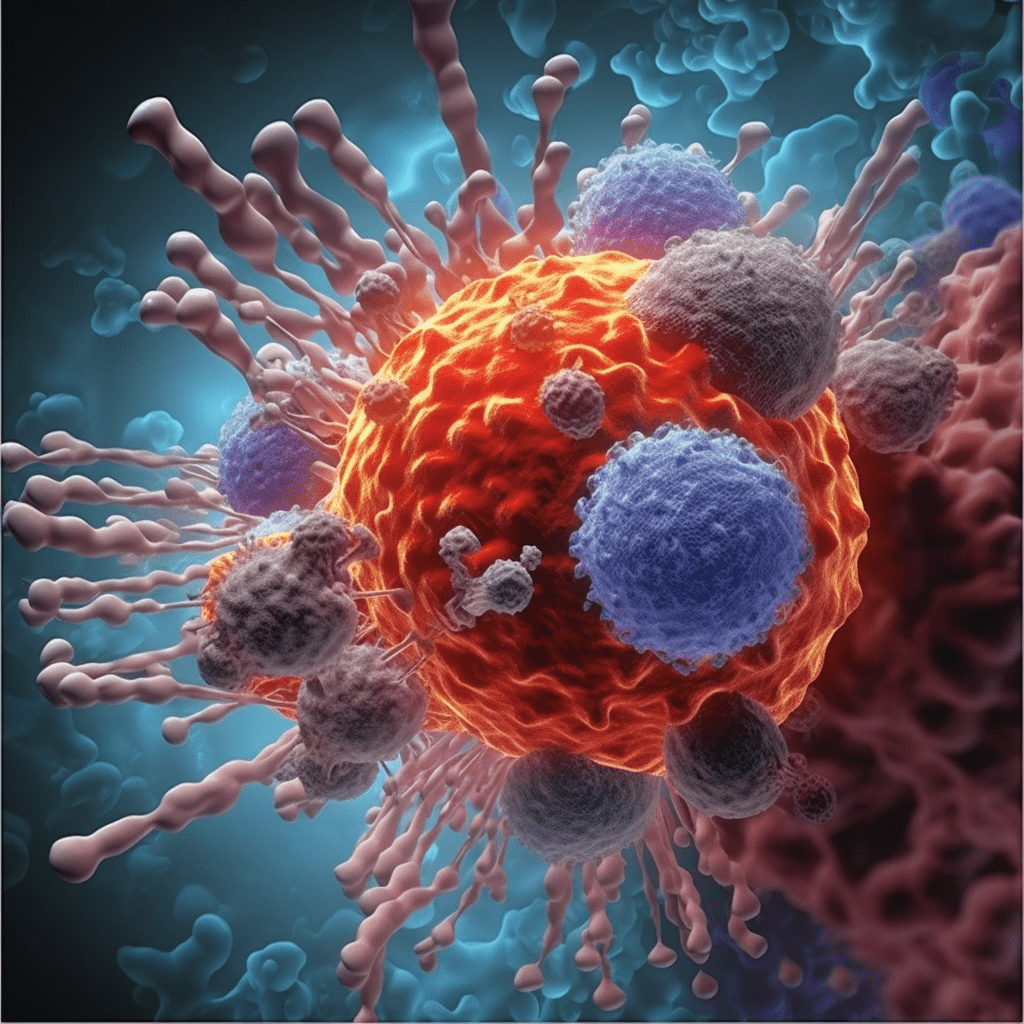Targeting the Anti-Inflammatory Response in Cancer
 2 years ago
By John Lewis Elopre
2 years ago
By John Lewis Elopre

Cancer, a complex and multifaceted disease, continues to pose a significant challenge to the field of medicine. Traditional cancer treatments, such as surgery, chemotherapy, and radiation therapy, have made substantial progress in extending patient survival rates. However, the need for more effective and less toxic treatment approaches persists. In recent years, scientists have increasingly explored the role of inflammation in cancer development and progression, leading to the exploration of targeting the anti-inflammatory response as a potential therapeutic strategy.
Understanding the Anti-Inflammatory Response in Cancer
What is the Anti-Inflammatory Response?
The anti-inflammatory response is the body’s natural defense mechanism against inflammation, which is a normal part of the immune system’s response to injury or infection. When inflammation persists or becomes chronic, it can promote tumor growth and metastasis in certain cancer types.
Role of Inflammation in Cancer
Chronic inflammation contributes to various stages of tumorigenesis, including initiation, promotion, and progression. Inflammatory cells release cytokines and growth factors that can encourage cancer cell proliferation, survival, and migration. Moreover, inflammation can suppress the immune system’s ability to detect and eliminate cancer cells.
Targeting Inflammation for Cancer Treatment
Inhibiting Inflammatory Pathways
Researchers are investigating specific signaling pathways that play a crucial role in chronic inflammation and cancer development. By targeting these pathways with inhibitors or monoclonal antibodies, scientists hope to disrupt the pro-tumorigenic effects of inflammation.
Anti-Inflammatory Drugs in Cancer Therapy
Some existing anti-inflammatory drugs, such as nonsteroidal anti-inflammatory drugs (NSAIDs) and corticosteroids, have shown promise in preclinical studies for their potential to reduce cancer risk. Clinical trials are underway to assess their efficacy in combination with standard cancer treatments.
Immunotherapy and Inflammation
Harnessing the Immune System Against Cancer
Immunotherapy has revolutionized cancer treatment by mobilizing the patient’s immune system to recognize and attack cancer cells. However, not all patients respond equally to immunotherapies. Understanding the interplay between inflammation and immunotherapy response is essential for developing more personalized and effective treatments.
Combining Immunotherapy with Anti-Inflammatory Approaches
Combinations of immunotherapy and anti-inflammatory strategies are being explored to enhance treatment outcomes. By dampening chronic inflammation, researchers aim to create a more favorable tumor microenvironment for immunotherapy success.
Lifestyle and Dietary Interventions
Impact of Lifestyle on Inflammation
Certain lifestyle factors, such as smoking, lack of physical activity, and poor diet, can promote inflammation. Encouraging healthier lifestyle choices may complement medical treatments in cancer prevention and management.
Anti-Inflammatory Diets and Cancer Prevention
Researchers are studying the impact of anti-inflammatory diets, rich in fruits, vegetables, whole grains, and healthy fats, in reducing cancer risk. These diets may mitigate chronic inflammation and support overall health.
Potential Challenges and Limitations
Balancing Inflammation for Optimal Response
Inflammation is a double-edged sword in cancer. While acute inflammation helps eliminate pathogens and promote tissue repair, chronic inflammation can fuel cancer growth. Striking the right balance is critical in therapeutic interventions.
Risks and Side Effects of Anti-Inflammatory Treatments
Anti-inflammatory drugs may have potential side effects and risks that need to be carefully evaluated. Understanding the safety profile of these treatments is crucial in clinical practice.
Promising Research and Clinical Trials
Breakthroughs in Targeting the Anti-Inflammatory Response
Several novel approaches targeting the anti-inflammatory response have shown promise in preclinical studies. These discoveries pave the way for innovative therapies that could transform cancer treatment.
Ongoing Studies and Future Directions
Clinical trials investigating anti-inflammatory therapies in cancer patients are ongoing. Early results are encouraging, and future research aims to refine these treatments further.
Conclusion
Targeting the anti-inflammatory response represents a promising avenue in the fight against cancer. By understanding the intricate relationship between inflammation and tumorigenesis, researchers are developing novel treatments that complement existing therapies. The integration of anti-inflammatory strategies with immunotherapy and lifestyle interventions offers hope for more effective and personalized cancer care.
FAQs
- Can anti-inflammatory drugs cure cancer? Anti-inflammatory drugs alone cannot cure cancer. However, they may complement existing treatments and improve outcomes in some cases.
- Are anti-inflammatory diets effective for all cancer types? While anti-inflammatory diets can promote overall health, their specific impact on cancer prevention may vary depending on the cancer type and individual factors.
- Do all cancer patients have chronic inflammation? Not all cancer patients have chronic inflammation, but inflammation can influence cancer development and progression in certain cases.
- What are the potential risks of targeting inflammation in cancer therapy? Anti-inflammatory treatments may have side effects, including gastrointestinal issues and increased risk of infections. Close monitoring is essential.
- How can lifestyle changes help in cancer management? Lifestyle changes, such as quitting smoking, regular exercise, and a balanced diet, can contribute to overall well-being and potentially reduce cancer risk.

Navigating the Complex World of Global Regulatory Affairs in Oncology
In today's fast-paced global pharmaceutical landscape, the regulatory affairs sector plays a pivotal role in ensuring the safety, efficacy, and market access of oncology drugs. As the demand for innovative cancer therapies continues to grow, understanding the intricacies of global...
2 years agoNavigating the Complex World of Global Regulatory Affairs in Oncology
In today's fast-paced global pharmaceutical landscape, the regulatory affairs sector plays a pivotal role in ensuring the safety, efficacy, and market access of oncology drugs. As the demand for innovative cancer therapies continues to grow, understanding the intricacies of global...
2 years ago
Overcoming the Hurdles: Navigating the Challenges in Oncology Clinical Trials
In the world of medical research, oncology clinical trials are at the forefront of innovation and discovery. These trials play a crucial role in advancing our understanding of cancer and developing more effective treatments. However, the path to successful oncology...
2 years agoOvercoming the Hurdles: Navigating the Challenges in Oncology Clinical Trials
In the world of medical research, oncology clinical trials are at the forefront of innovation and discovery. These trials play a crucial role in advancing our understanding of cancer and developing more effective treatments. However, the path to successful oncology...
2 years ago
Embracing a Patient-Centric Approach in Oncology Trials
In the realm of healthcare and medical research, the term "patient-centric" has gained significant traction in recent years. This shift in focus towards prioritizing patients' needs and preferences is not only transforming the healthcare industry but is also making waves...
2 years agoEmbracing a Patient-Centric Approach in Oncology Trials
In the realm of healthcare and medical research, the term "patient-centric" has gained significant traction in recent years. This shift in focus towards prioritizing patients' needs and preferences is not only transforming the healthcare industry but is also making waves...
2 years ago